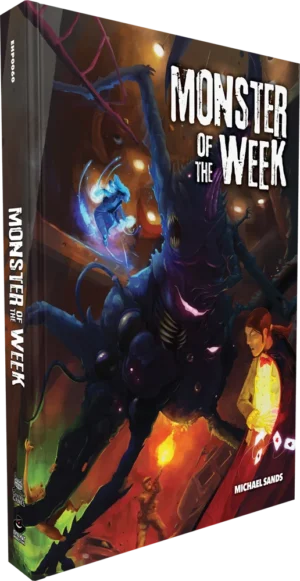Monsterhearts Urban Fantasy; Dark; Psychological; Powered by the Apocalypse (PbtA); Narrative-Driven; Character Customization; Collaborative Worldbuilding
Monsterhearts is a Powered by the Apocalypse (PbtA) tabletop roleplaying game focused on the turbulent lives of teenage monsters. It blends urban fantasy with dark, psychological themes, emphasizing narrative-driven gameplay, character customization, and collaborative worldbuilding. The game explores the challenges of adolescence through the lens of supernatural beings, creating a unique and often emotionally charged player experience. While it draws inspiration from various media, its emphasis on interpersonal drama and personal horror distinguishes it from more plot-driven games like Buffy the Vampire Slayer.
Theme and Setting
Monsterhearts is set against the backdrop of a fictional high school and its surrounding environment, collaboratively defined by the players during character creation. The setting is designed to foster stories about the messy lives of teenage monsters, exploring themes of adolescent angst, personal horror, and secret love triangles. The monster identity of each character is allegorical, mirroring the trials of growing up. Characters grapple with changing bodies, emerging sexuality, and the struggle for social power, all amplified by their supernatural natures. The game prompts players to draw connections between the monstrous and the mundane, revealing that sometimes the most terrifying things are not supernatural, but human.
Core Mechanics and Rules
As a PbtA game, Monsterhearts utilizes a narrative-driven system where players roll 2d6 plus a relevant stat (Hot, Cold, Volatile, or Dark) to determine the outcome of their actions. On a 10+, they succeed; on a 7-9, they succeed with a complication or hard choice; and on a 6 or less, the MC (Master of Ceremonies) makes a 'hard move,' introducing a problem or setback. A key mechanic is the use of 'strings,' representing social leverage characters have over one another. Strings can be spent to influence dice rolls, inflict conditions, or manipulate other characters by offering them experience points (XP) to comply. This system emphasizes player-to-player interaction and the consequences of social dynamics. The game also includes 'Darkest Self' mechanics, which trigger when things go wrong, exploring the darker aspects of each monster's nature.
What Makes it Unique
Monsterhearts stands out due to its unflinching exploration of sexuality and queer content. Unlike many other RPGs, it allows any player to 'turn on' another character, reflecting the confusion and involuntary nature of teenage attraction. Each character also has a 'Sex Move,' defining what happens when they engage in sexual activity. This mechanic encourages players to explore sexuality in all its permutations, good and bad, healthy and unhealthy. This explicit focus on sexuality, combined with its emphasis on interpersonal drama and personal horror, differentiates it from other urban fantasy RPGs. The game intentionally minimizes GM prep, promoting a feral and emergent narrative shaped by player interactions rather than a predetermined plot.
Target Audience and Player Experience
Monsterhearts is geared towards players who enjoy narrative-driven, character-focused gameplay and are comfortable exploring potentially difficult themes such as dysfunctional relationships, teen sexuality, coercive power, and queer marginalization. The game's focus on interpersonal conflict and emotionally intimate moments may not appeal to players seeking traditional adventure or combat-heavy experiences. Players should be prepared to collaborate on worldbuilding, embrace melodrama, and engage with potentially uncomfortable content. The game fosters a unique player experience where the terror and confusion of adolescence are amplified through the lens of supernatural beings, offering a space for self-examination and exploration of identity.



